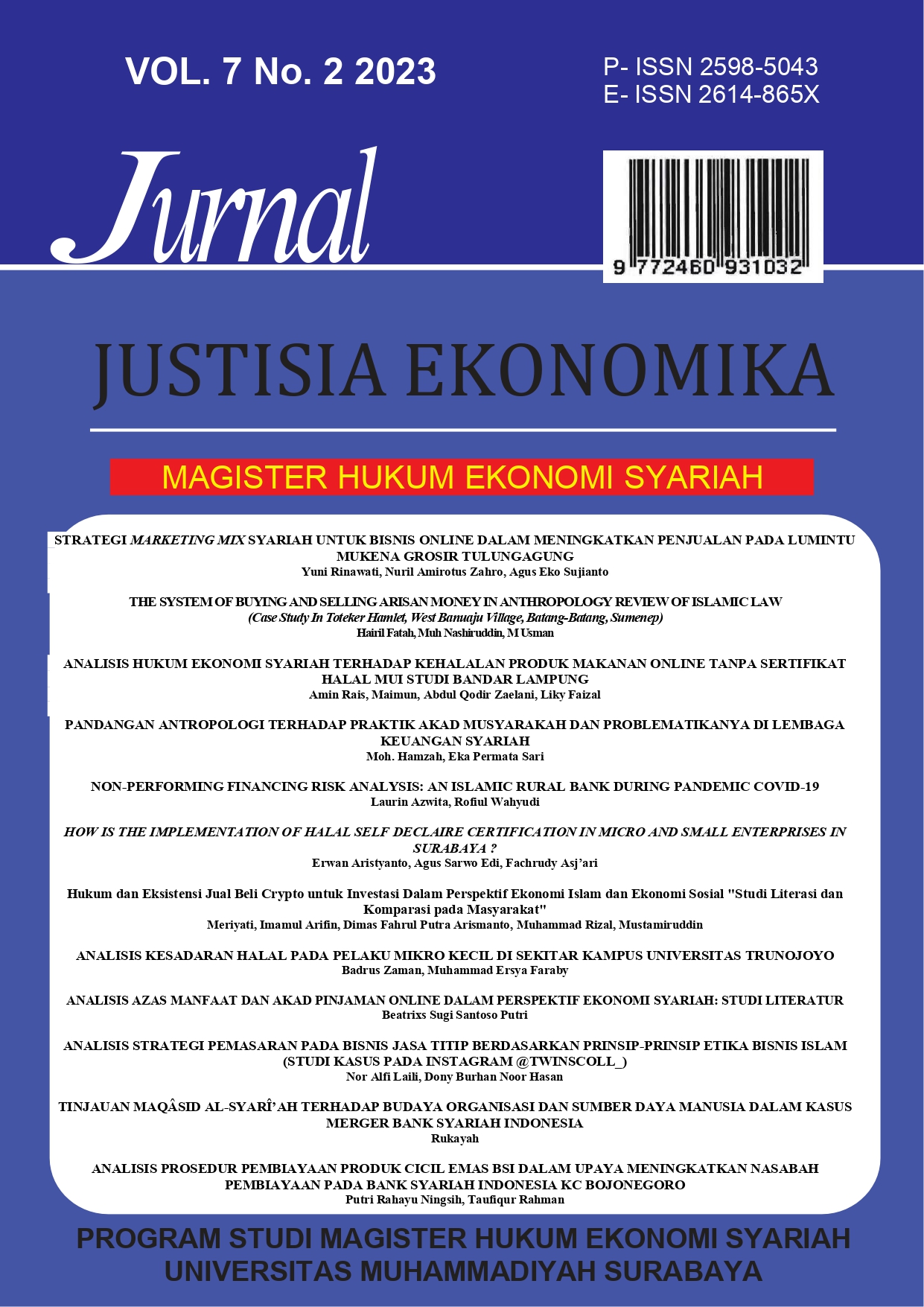ANALISIS HUKUM EKONOMI SYARIAH TERHADAP KEHALALAN PRODUK MAKANAN ONLINE TANPA SERTIFIKAT HALAL MUI
DOI:
https://doi.org/10.30651/justeko.v7i2.18773Kata Kunci:
Halal Product Guarantee, Online Food Products, Sharia Economic LawAbstrak
This article aims to explain the results of the author's analysis of the implementation of halal certificates on food products sold online, inhibiting and supporting factors for the application of halal certificates to food sold online, and the impact of Sharia economic law on the haleness of food products sold online without halal certificates. The results of the 2021 survey on e-commerce statistics show that the types of goods and services sold the most online in Lampung are food and beverage groups, totaling 40.86 percent of all businesses sampled by e-commerce. The rapid progress of buying and selling food online has become an additional task for halal certificate implementation agencies in providing security and comfort, especially for Muslim consumers in Indonesia, so they can consume halal food that is traded online. The research methodology that the author uses is qualitative in terms of the type of research documentation, interviews, and observations. The author goes directly to the field to conduct observations and interviews with primary data derived from the results of interviews with the BPJPH task force and LPPOM MUI. The results of the study show that there are no special strategies for food sold online. Supporting factors include the existence of institutions assisting the halal product process for MSME business actors. The inhibiting factor is that there is no direct regulation of cooperation with online business application server managers, a lack of public understanding of halal certificates, Analysis of Sharia Economic Law on the haleness of food products sold online: the haleness of products sold online or offline without MUI halal certificates are categorized as syubhat. According to Imam Nawawi, doing syubhat is form of underestimating.the.law.without.realizing.that.they.have.done.haram.
Referensi
Abdul Rohman, Pengembangan dan Analisis Produk Halal, Yogyakarta: Pustaka Pelajar, 2012.
Abdurrahman Konoras, Jaminan Produk Halal Di Indonesia Perspektif Hukum Perlindungan Konsumen Jakarta: Rajawali Press, 2017.
Abdurrahmat Fathoni, Metodologi Penelitian Dan Teknik Penyusunan Skripsi Jakarta: Rineka Cipta, 2006.
Asrorun Ni’am Sholeh, Metodologi Penetapan Fatwa Majelis Ulama Indonesia: Penggunaan Prinsip Pencegahan Dalam Fatwa Jakarta: Emir, 2015.
Diriwayatkan oleh (al Bukhari dan Muslim, dan ini adalah lafazh Muslim).
Dokumentasi Kantor Kemenag, Layanan Satgas Jaminan Produk Halal Provinsi Lampung.
H. Abd Rahman Ghazaly, H. Ghufron Ihsan, and Sapiudin Shidiq, Fiqh muamalat, Jakarta: Kencana Prenada, 2010.
https://databoks.katadata.co.id/datapublish/2023/03/28/ini-jumlah-populasi-muslim-di-kawasan-asean. indonesia -terbanyak, di akses 4 Juli 2023.
Indonesia and Pusat Bahasa (Indonesia), Kamus Besar Bahasa Indonesia Pusat Bahasa.
Muchtar Ali, “Konsep Makanan Halal Dalam Tinjauan Syariah Dan Tanggung Jawab Produk Atas Produsen Industri Halal,” AHKAM : Jurnal Ilmu Syariah 16, no. 2 December 11, 2016.
Mukti Fajar and Yulianto Achmad, Dualisme Penelitian Hukum : Normatif & Empiris Yogyakarta: Pustaka Pelajar, 2010.
Panduan Sistem Jaminan Halal LPPOM MUI Jakarta: Lembaga Pengkajian Pangan, Obat-Obatan Dan Kosmetika MUI, 2008.
Pedoman dan Prosedur Penetapan Fatwa Majelis Ulama Indonesia, Pasal 1 ayat (19).
Pedoman Penetapan Fatwa Majelis Ulama Indonesia Pasal 1 Ayat (17).
Peraturan Rumah Tangga MUI, Pasal 5 ayat 1-3
Salim HS and Erlies Septiana Nurbani, Penerapan Teori Hukum Pada Penelitian Tesis Dan Disertasi Jakarta: Raja Grafindo Persada, 2018).
Soerjono Soekanto, Faktor-Faktor Yang Mempengaruhi Penegakan Hukum Jakarta: PT. Raja Grafindo Persada, 2007.
Soerjono Soekanto, Faktor-Faktor Yang Mempengaruhi Penegakan Hukum Jakarta: PT. Raja Grafindo Persada, 2007.
Sumber data: https://kbbi.web.id/sertifikat, diakses tanggal 12/11/2022
Susiadi AS, Metodologi Penelitian Seksi Penerbitan Fakultas Syariah IAIN Raden Intan Lampung, 2014.
Titi Kanti Lestari, Statistik E-Commerce 2021 Jakarta: ©Badan Pusat Statistik, 2021
Warto Warto and Zainal Arif, “Bisnis Produk Halal antara Peluang dan Tantangan, Problematika dan Solusinya,” Al-Ulum 20, no. 1.
Wawancara bersama Ligan Jefriansah mengenai pelaksanaan sertifikat halal pada produk yang di jual secara online.
Unduhan
Diterbitkan
Cara Mengutip
Terbitan
Bagian
Lisensi
HAK CIPTA
Penulis yang mengirimkan artikel dalam jurnal Justisia Ekonomika harus memahami dan menyetujui persyaratan tentang hak cipta jurnal Justisia Ekonomika sebagai berikut:
1. Hak Cipta tulisan / artikel yang diterbitkan di jurnal Justisia Ekonomika otomatis menjadi hak pengelola jurnal atau publisher
2. Meskipun Hak Cipta atas tulisan yang telah diterbitkan di jurnal Justisia Ekonomika adalah menjadi haknya publisher, tetapi penulis masih mempunyai hak untuk : a). Penulis boleh meng-upload di repository kampus, b). Penulis boleh meng-upload di webnya sendiri, c). Penulis boleh meng-upload di google schoolar, orchid dan sinta
LISENSI
Lisensi atas tulisan / artikel yang diterbitkan di jurnal Justisia Ekonomika adalah menggunakan Creative Commons dengan atribusi CC-BY-NC 4.0






















